- Home
- Thomas E. Sniegoski
The Fallen Page 6
The Fallen Read online
Page 6
He could hear her turn the page of a pad of paper where she had written her notes.
“And be reminded that you have a two o’clock conference with the zoning committee about the Pier Road project.”
Believing that she had finished, he walked through the kitchen, bottle in hand, toward the bathroom. But she began to speak again. He paused in the hall to listen.
“Oh yes,” she said, “an old friend of yours—a Mr. Verchiel, stopped by the office this morning. He said he will only be in town for a short time and hoped the two of you could get together.”
“Verchiel,” he whispered. The bottle dropped from his hand to the floor, shattering and spilling the expensive contents onto the black and white tiles.
“He said that he will be in touch,” Joyce said from the machine. “There are a few other items, but we can discuss them when you get here. Good morning, sir.”
The line disconnected and still he didn’t move.
Verchiel.
Sam Chia bounded to his bedroom and threw open the doors of the heavy wooden armoire. He shed his robe and pulled out clothes. There would be no time for a shower today and he would not be going into the office.
He had to leave Hong Kong. It was as simple as that. If Verchiel had found him, then there was no doubt that the Powers had come to China. And if that were the case, then none of his ilk was safe.
Sam finished buttoning his white cotton shirt and began to tuck its tails inside his pants. He cinched the brown leather belt around his waist.
He thought briefly about contacting the others, to warn them of the Powers’ presence, but decided against it for it was likely already too late.
He slipped his bare, delicate feet into a pair of Italian loafers and donned a navy blue sports jacket.
He would go to Europe; France would suffice. He would stay in Paris until Verchiel and his dogs left China. Joyce could manage his affairs until he returned.
Sam placed his billfold inside his coat pocket and picked up the phone to summon his driver. He would go to the airport, charter a plane, and contact Joyce once in flight.
“Are you going out, Samchia?” asked a voice from somewhere in the room.
Startled, Sam dropped the phone and spun around to face the voice.
“How disappointing,” said the man in the gray trench coat standing in the living room in front of the sixty-inch digital television. “After we’ve spent all this time searching for you.”
There was a small, dirty child with him who pressed its unwashed face against the smoothness of the television screen and licked eagerly at his reflection.
“I’m sorry, do you prefer being called by your monkey name—Samuel Chia?” Verchiel asked as he slid his hands inside his coat pockets and began to slowly advance toward him. The child followed, heeling obediently at his side.
“What do you want?” Sam asked as the man approached.
Verchiel’s dark eyes roamed about the luxurious living quarters taking in every extravagant detail.
“Did you think that these would hide you from me?” he asked, pointing to a series of arcane symbols painted on the penthouse walls. To the human eye they appeared as decoration, but in actuality, they were much more than that.
The feral child had hopped up onto Sam’s leather coach, jumping from foot to foot, as he muttered happily to himself in a singsong voice.
“The spell of concealment must have gone stale with all the recent changes here,” Verchiel said, making reference to the recent shift in Chinese government. “My hound caught scent of you as soon as we arrived.” He patted the child’s head affectionately as he passed the sofa. “You live like a king amongst the animals,” the pale-skinned man said as he fixed his bottomless black gaze upon Sam. “For this you abandoned Paradise?”
Verchiel’s words stung like the barbed end of a whip’s lash.
“You know that’s untrue, Verchiel. I left because I did not want to choose sides. I loved the Morningstar, as I loved all my brethren, but to question the Almighty—I could think of no other solution but to flee.” Sam lowered his head, disgraced by his admission. Even after all this time, his actions shamed him.
“A coward by your own admission,” Verchiel said with a snarl as he moved closer. “If only the others could be so honest.”
The phone began to ring again, and Sam watched Verchiel’s attention turn to the device as the recorded message played out and Joyce began to speak.
“Joyce again, sir. Mr. Dalton from the licensing board just called and asked if you could reschedule Monday’s meeting to—”
A blast of searing white light erupted from Verchiel’s hand and melted the phone into nothing more than sputtering, black plastic slag. Startled, the child leaped from the sofa and ran to hide, as if sensing the violence that was sure to follow.
“The sound of their voices,” Verchiel said, his right hand gesturing toward his ear, “like the chattering of animals. It annoys me to no end.” Verchiel glided closer. “How do you stand it?”
Sam clenched his fists. Anger unlike any he had ever experienced coursed through his body. Perhaps he had spent too much time among the humans, he thought. Their rabid emotions had obviously begun to rub off on him.
“I’ll ask you again, why have you come here?”
Verchiel cocked his head to one side. “Is it not obvious, brother?” he asked. “Have you not been awaiting me since your fall?”
“Yes,” he hissed, “but it’s been years—thousands of years.”
Verchiel shook his head as he replied. “A second, an hour, a millenium; increments of time that mean nothing to the Powers,” he said with a cold indifference. “You have sinned against the Allfather, and time does not change that fact.”
Sam began to back away. “Haven’t I suffered enough?” he asked. “My self-imposed exile on this world has taught me that—”
Verchiel’s hand shot up into the air in a gesture to silence him. “Cease your mewling; I do not wish to hear it.” The leader of the Powers pointed toward the windows behind him. “You sound like one of them.” There was revulsion in his voice.
Sam knew it was probably for naught, but if there was anything he learned from living among humans, it was that it didn’t hurt to try. “But isn’t it enough that I have been denied the voice of my Father, that my true aspect is but a shadow of my former glory? Does this not count for anything?” He touched his chest as he continued his plea. “You may not believe it, but I have suffered.”
Verchiel again looked about the opulent living space. A cruel grin began to form on his pale white features as he fixed Sam with his icy stare.
“Suffered, have you?” he asked as he began to spread his arms. “Your suffering hasn’t even begun.”
Sam experienced a strange sense of elation mixed with sheer terror as he watched the enormous wings erupt from Verchiel’s back.
I once had wings as mighty, he remembered with overwhelming sadness. Wings that could have taken him away from this place, allowed him to flee the judgment of Verchiel. But that was long, long ago, and what were once mighty, were now nothing more than an atrophied shadow of their former glory.
Verchiel began to rhythmically move his wings and the penthouse was suddenly filled with winds as strong as tropical storms.
“Verchiel, please,” Sam pleaded, just before a crystal ashtray hit him in the face. It opened a bleeding gash above his right eye.
Sam’s body went limp and he ceased to struggle against the currents for a brief moment. He was picked up by the powerful gale and hurled backward, pinned against the picture windows. As he slammed against the glass, the sound of something cracking filled his ears, and he wondered if it was the window behind him or his bones.
Verchiel’s wings beat the air with ferocious abandon, their furious movement a ghostly blur.
“There is no mercy for what you have done, Samchia!” Verchiel shrieked over the pounding of the air. “Your time has come, as it will come for all the others who
have fallen from His grace!”
Sam tried to pull himself away from the window, but the strength of the wind was too great. He wanted to speak, to scream out that he was truly sorry for his sins, but the blood from his head wound streamed down his face into his mouth, silencing him. He had never even seen his own blood, but now it was filling his mouth with its foul taste.
The inch-thick pane of window glass behind him began to crack and spiderweb across its surface. Windows that had been built to withstand powerful storms from the Pacific Ocean were no match for the power of Verchiel.
Again Sam struggled to speak. “Verchiel…,” he managed to bellow above the sounds of his brother’s merciless wings.
Verchiel continued his advance, wings flapping faster and faster still. “I can’t hear you!” he screamed in response.
Sam yelled all the louder. “Tell Him—tell Him that I’m sorry.” He could see the look of revulsion on Verchiel’s face, and knew his words of repentance were heard.
A heavy chrome kitchen chair tumbled away from the table, and as if made of tin, was propelled through the air toward him.
Sam closed his eyes on the horrible visage of Verchiel, his wings unmercifully assaulting the air. His time was at an end, of this he was certain. What he had feared most since falling to Earth was finally to claim him.
Samuel Chia, formerly Samchia of the Heavenly Host, willed his mind elsewhere, to a time before the war, before impossible choices, before the fall.
The chrome projectile did not strike him directly, but smashed into the window to the left of him, shattering the glass, allowing it to give way beneath the turbulent force of Verchiel’s wings.
Within a twinkling shower of razor-sharp glass and debris, Sam fell yet again.
And as he descended to his end, he dreamed.
He dreamed of flying.
Gabriel trotted happily into the living room where the Stanleys had assembled for Chinese takeout and the weekly Friday night movie rental. He was proudly holding a purple stuffed toy in his mouth.
Aaron sat on the floor with Stevie building a multicolored tower with Duplo blocks. Occasionally he looked up at the television to see what Mr. Schwarzenegger was blowing up. The fact that this was at least the third time his foster dad had rented the movie in the last six months didn’t bother him. The night was all about distraction, anything to keep from thinking about the strange incidents of the last two days. Except for the conversation with Vilma Santiago, he wished he could forget them completely.
The dog dropped the purple toy before Aaron and it rolled to topple the Duplo tower.
“Gabriel,” Aaron said, annoyed, as he batted the toy aside and attempted to right the structure.
“Play with Goofy Grape now,” Gabriel demanded with a wag of his thick, muscular tail.
Aaron ignored him and helped the child select some more blocks to fortify the tower.
Gabriel lunged forward and snatched up the toy with his mouth. He gave it a ferocious shake and let it fly. The stuffed toy bounced off young Stevie’s head and landed among the piles of unused blocks.
“Goofy Grape now,” the dog said even louder.
Aaron glared at the animal. “No Goofy Grape,” he said sternly, referring to the toy that he had nicknamed because it resembled an enormous grape with a face. “I’m playing with Stevie now. Go lie down.”
He could feel the dog’s intense stare upon him, as if he were attempting to use mind powers to sway his decision. Aaron didn’t bother to look up, hoping the dog would eventually grow tired and go away.
Gabriel abruptly turned and quickly strolled from the room.
Good, Aaron thought, connecting a blue block to a yellow. He didn’t want to hear the dog talking tonight. To anyone else it was typical dog noise, a series of whines, growls, and barks, but to Aaron it was a language—a language he could easily understand. Tonight he wanted it to be like it used to be. A bark, an excited wag of the tail—that was all the conversation he really needed from his four-legged friend.
From the couch Tommy Stanley let out a happy guffaw in response to one of the movie hero’s patented catch phrases.
“No one says ’em like Arnold,” his foster father said aloud, a critical observation about the art of action films. “Your Van Dammes, Seagals—they’re all well and good with the fightin’ and blowin’ up crap, but nobody delivers the goods like Ahnold.” He said the name with a mock Austrian accent and then went back to watching the film, sucked into the cinematic world of a one-man army out to rescue his little girl from the bad guys.
Aaron heard the sound of toenails clicking across the kitchen linoleum toward the living room, and then a strange grunting sound. He didn’t even have to see what the dog was bringing from his toy box; he knew just from the sound. Squeaky Pig was on its way.
Gabriel came around the corner, a pink stuffed pig clutched in his maw. With his muscular jaws he squeezed the body of the pig repeatedly, and it emitted a sound very much like that of a pig grunting.
As before, the dog approached and let the toy fall to the floor.
“Squeaky Pig better,” he said with a hint of excitement in his gruff-sounding language. “Play with Squeaky Pig.”
Aaron felt his temper rising. He was angry with the day and all the stuff that had happened, angry with the dog for reminding him that things are not how they used to be, angry with himself for being angry.
“He’s pretty vocal tonight,” Lori said from the recliner, looking up from her book. When she had seen what movie her husband brought back from the video store, she had gone upstairs to get out her latest romance novel. “Does he need to go out or something?”
The dog is being “vocal,” he thought. If you only knew the half of it.
“No,” he said, giving Gabriel the evil eye. “He doesn’t need to go out, he’s just being a pain in the butt.”
Gabriel flinched as if he’d been struck. He blinked his soulful, brown eyes repeatedly and lowered his ears flat against his skull.
“Not pain in the butt,” the dog grumbled as he began to back from the room, his tail lowered and partially stuck between his legs. “Just wanted to play with Aaron. Bad dog. Go lie down. Bad dog.”
He turned and sadly slunk from the room.
Gabriel’s words stung. How could I be so cruel? Aaron thought disgustedly. Here he was with the unique ability to understand exactly what the dog wanted—to be played with, to be shown some attention—and he was so caught up in his own problems that he couldn’t be bothered to give in to the dog’s simple request. I ought’a be ashamed.
“Gabriel,” he called out. Aaron had to call for him two more times before the dog finally responded, peeking around the doorframe.
“C’mere,” he said, patting the floor with his hand and smiling. “Come over here.”
Gabriel bounded into the room tail wagging, and began to lick Aaron’s face excitedly.
“Gabriel not pain in butt, yes?” he asked between licks.
“No,” Aaron answered, taking the dog’s blockhead in his two hands and looking directly into his brown eyes. “You’re not a pain in the butt; you’re a good boy.”
“I’m a good boy,” the dog happily repeated, and began to lick his face again.
Gabriel plopped his large body down beside Aaron and was having his tummy rubbed when Stevie looked up from his blocks. Aaron noticed the child’s stare and smiled.
“Hey there, little man, what’s up?” he asked the autistic child.
The child’s change of expression could be described like the sun burning through a thick haze of storm clouds. His usually blank face became animated as his eyes twinkled with the light of awareness. A smile so bright and wide spread across Stevie’s face that Aaron was genuinely warmed by its intensity.
“Bootiful,” Stevie said, holding out his hand.
“Stevie?” Lori questioned, her paperback falling to the floor. “Tommy, look at Stevie.”
But the sound of his son’s voice had alread
y pulled Tom away from the movie. They both slid from their seats to the floor and watched as their child gently touched Aaron’s cheek with a tiny hand, a smile still radiating from his usually expressionless face.
“Bootiful,” the child repeated. “Bootiful.”
Then, as quickly as awareness had appeared, it was gone, the clouds again covering up the sun.
Stevie showed no sign that he even remembered what he had just done. He simply returned his attention to his blocks.
“He spoke to you,” his mother said, grabbing Aaron by the shoulders and squeezing excitedly. “He actually spoke to you.”
Tommy kneeled by his son, grinning from ear to ear. “What do you think it means?” the big man asked, his voice filled with emotion. “He hasn’t said a word in two years.” He touched the boy’s head lovingly. “That would be something, wouldn’t it?” he wondered aloud, his eyes never leaving Stevie. “If he started to talk again.”
Both parents began to play with the child and his blocks, hoping to elicit another verbal response. Something, anything to prove that the boy’s sudden reaction wasn’t just a fluke.
Stevie remained in his world of silence.
Aaron got up. “Do you want an apple?” he asked Gabriel.
The dog sprang to his feet and wagged his tail. “Apple, oh yes,” he said. “Hungry, yes. Apple.”
As they left the room Aaron couldn’t shake the uncomfortable feeling that Stevie’s behavior was somehow connected to the bizarreness that had been affecting his life since his birthday. So much for distraction, he thought as he took an apple from the small wicker basket atop the microwave and brought it to the cutting board on the counter.
“Did you see the way he looked at me?” Aaron asked the dog as he took a knife from the dish strainer by the sink and split the fruit in half. “It was like he was seeing something—something other than me.”
“Bootiful,” Gabriel responded, gazing up by his side. “He said bootiful.”
Aaron cut the core out, then cut half of the apple into strips.
“The way he looked at me, it was like the old man at the common.”

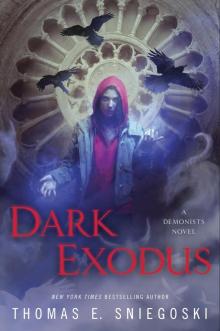 Dark Exodus
Dark Exodus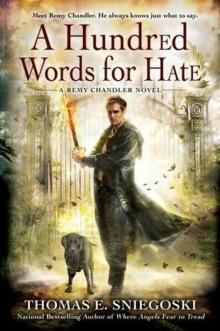 A Hundred Words for Hate rc-4
A Hundred Words for Hate rc-4 The Fallen
The Fallen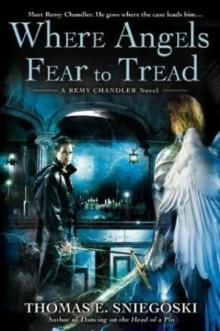 Where Angels Fear to Tread rc-3
Where Angels Fear to Tread rc-3 Armageddon
Armageddon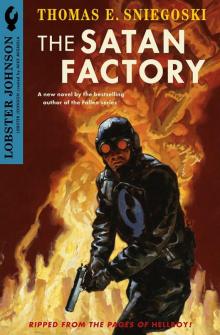 The Satan Factory
The Satan Factory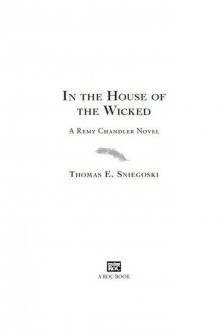 In the House of the Wicked: A Remy Chandler Novel
In the House of the Wicked: A Remy Chandler Novel A Hundred Words for Hate
A Hundred Words for Hate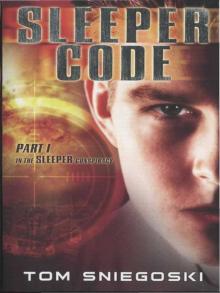 Sleeper Code
Sleeper Code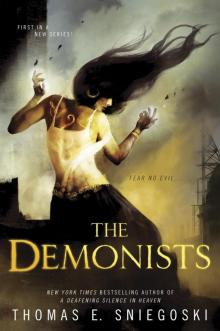 The Demonists
The Demonists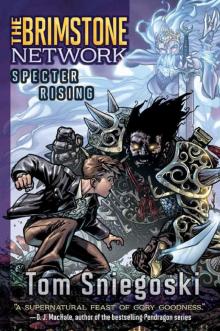 Specter Rising (Brimstone Network Trilogy)
Specter Rising (Brimstone Network Trilogy)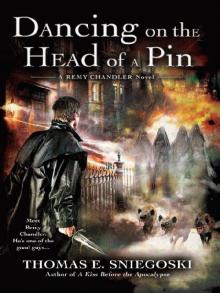 Dancing on the Head of a Pin
Dancing on the Head of a Pin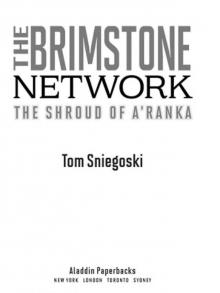 The Shroud of A'Ranka (Brimstone Network Trilogy)
The Shroud of A'Ranka (Brimstone Network Trilogy)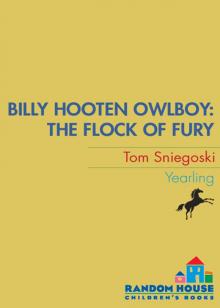 The Flock of Fury
The Flock of Fury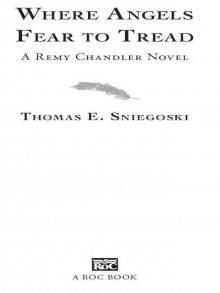 Where Angels Fear to Tread
Where Angels Fear to Tread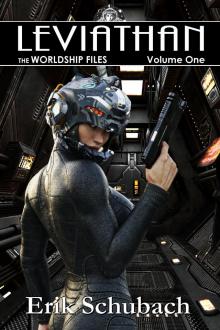 Leviathan
Leviathan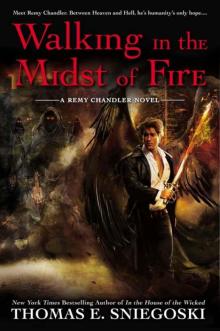 Walking In the Midst of Fire: A Remy Chandler Novel
Walking In the Midst of Fire: A Remy Chandler Novel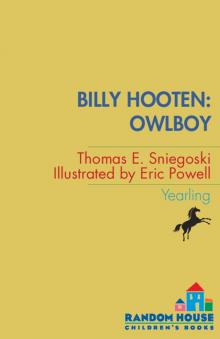 Billy Hooten
Billy Hooten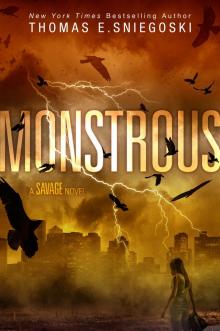 Monstrous
Monstrous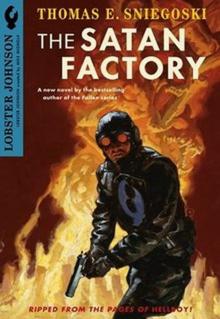 Lobster Johnson: The Satan Factory
Lobster Johnson: The Satan Factory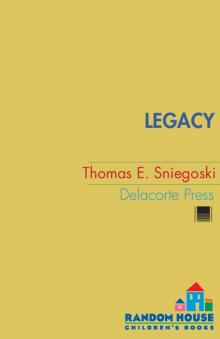 Legacy
Legacy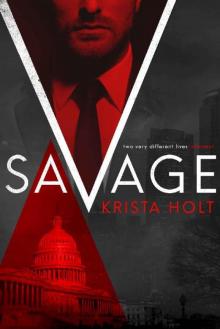 Savage
Savage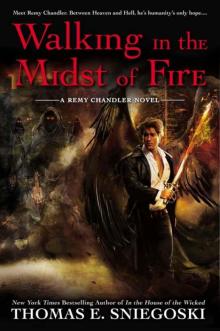 Walking In the Midst of Fire rc-6
Walking In the Midst of Fire rc-6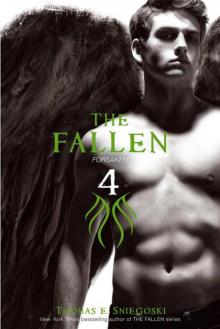 The Fallen 4
The Fallen 4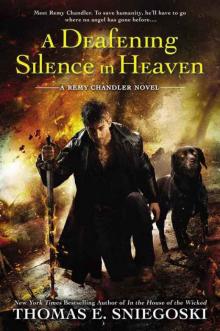 A Deafening Silence In Heaven
A Deafening Silence In Heaven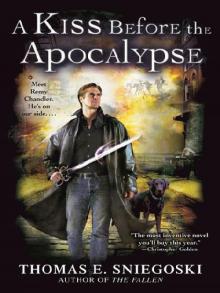 A Kiss Before the Apocalypse
A Kiss Before the Apocalypse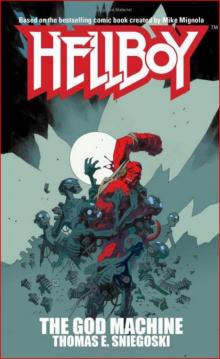 The God Machine
The God Machine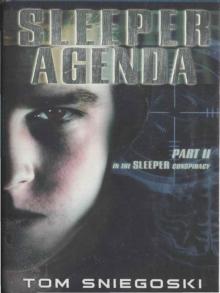 Sleeper Agenda
Sleeper Agenda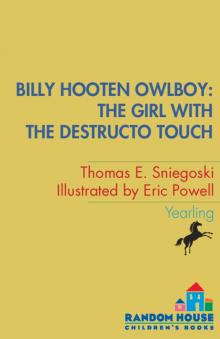 The Girl with the Destructo Touch
The Girl with the Destructo Touch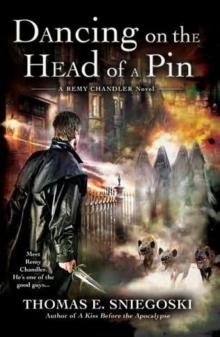 Dancing On the Head of a Pin rc-2
Dancing On the Head of a Pin rc-2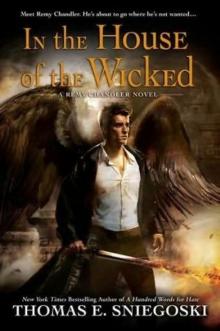 In the House of the Wicked rc-5
In the House of the Wicked rc-5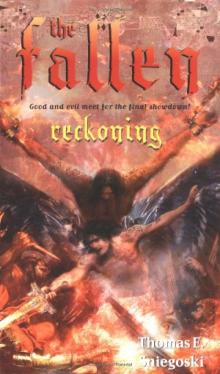 Reckoning f-4
Reckoning f-4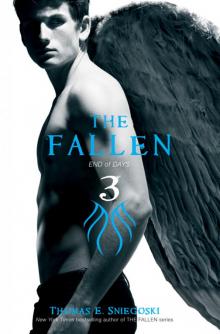 The Fallen 3
The Fallen 3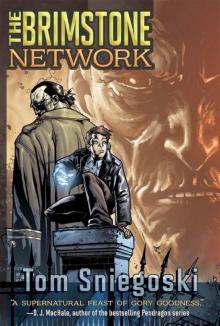 The Brimstone Network (Brimstone Network Trilogy)
The Brimstone Network (Brimstone Network Trilogy)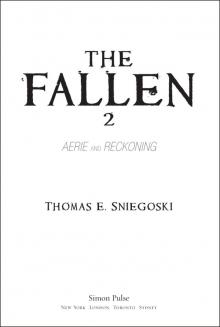 The Fallen 2
The Fallen 2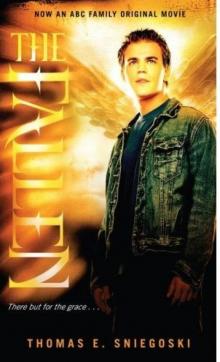 The Fallen f-1
The Fallen f-1